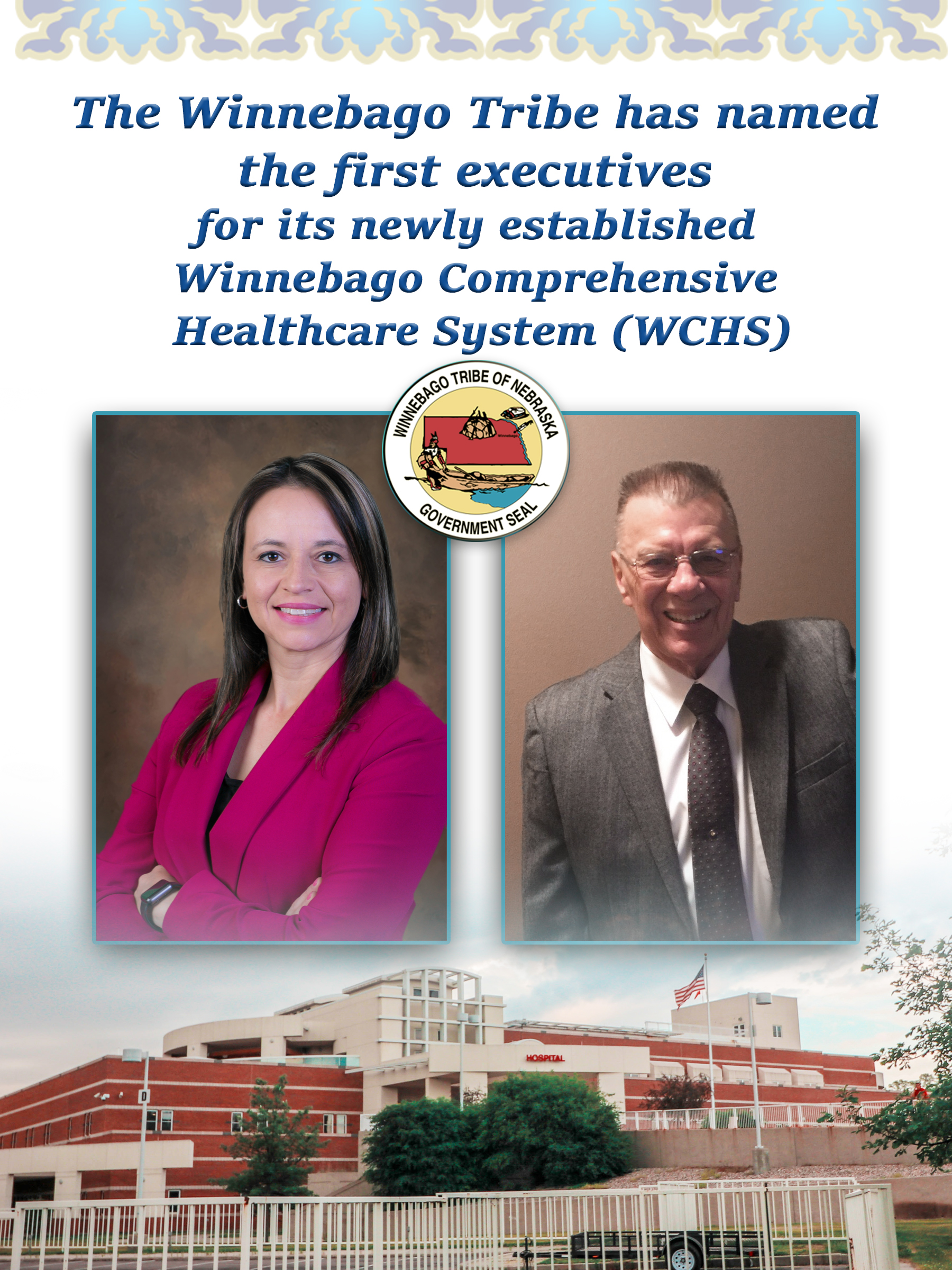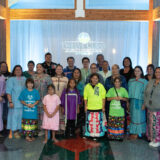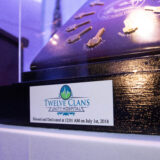
Announcing the Winnebago Health Foundation
The Winnebago Health Foundation was established in coordination with the Winnebago Comprehensive Healthcare System and the Winnebago Tribe of Nebraska. The mission of the Winnebago health foundation is to build enduring relationships that maximize advocacy and philanthropy to support the health of the Winnebago community and the people we serve. The primary objectives of the Foundation include fundraising activities to help meet the ongoing financial challenges for healthcare and reduce health disparities within the Winnebago community, increase access to comprehensive, quality healthcare programs and services with the use of dedicated resources, lead change strategies that educate, create and sustain healthier communities, expand education opportunities within the community by providing educational scholarships and paid internships to those entering the health field, and develop training programs in partnership with health professional schools to expand opportunities to educate and mentor youth interested in obtaining health science degrees.
Welcome To Winnebago Comprehensive Healthcare System
The Winnebago Comprehensive Healthcare System (WCHS) was established by the Winnebago Tribe of Nebraska to carry out health care services on behalf of the Tribe.
WCHS is comprised of two divisions: The Winnebago Public Health Department (WPHD) and Twelve Clans Unity Hospital (TCUH). Prior to WCHS being established, the health department was operated as an internal program of the Tribe and the hospital in Winnebago was managed by Indian Health Services (IHS).
The Health Department was formed by the Tribe in the late 1970s starting with Public Health Nursing and Community Health Representatives. Since then, it has grown to more than sixteen different programs to provide the vast array of health services available that are now available for the Winnebago Community.
In 2015 the Winnebago Tribe established a Self-Governance Steering Committee to plan and prepare for expanded public health services and eventual assumption of the hospital, formally known as the Omaha-Winnebago Hospital. In 2018, the Tribe completed negotiations with the Indian Health Service and entered into a Tribal Self-Governance Compact pursuant to Title V of the Indian Self-Determination and Education Assistance Act to carry out health program for the Tribe. On July 1, 2018, the Winnebago Tribe of Nebraska assumed management of the hospital and it was renamed Twelve Clans Unity Hospital in honor of the twelve traditional clans of the Winnebago Tribe.
To learn more about Tribal Self-Governance, click here. Under a shared vision and culture, WCHS strives to be an outstanding model in Indian Country with unified approach to health care.
Winnebago Tribe IHS Self-Governance Announcement – Winnebago Tribal Council Votes to Assume Operation of the Winnebago Hospital (Press Release)
Winnebago Tribal Council Resolution 18-08 regarding Participation in Indian Health Service Self-governance Program and Initiation of Negotiations to Assume Operation of Winnebago Hospital adopted November 9, 2017 – WTN-Self-Gov-Par
Winnebago Tribal Council Resolution 16-05 regarding Winnebago Indian Health Service Employees adopted October 21, 2015 – WTN-Self-Gov-IHS-Emp
The Winnebago Tribe has named the first executives for its newly established Winnebago Comprehensive Healthcare System (WCHS)
April 2018
Winnebago, Nebraska – Danelle Smith, a Winnebago Tribal Member, who has served for 14 years as the tribe’s general legal counsel, will oversee the WCHS as the Executive Director. For the past 2 and a half years, Smith served on the tribe’s Self-governance Steering Committee, which has carried out planning and implementation of the tribe’s assumption of the Indian Health Service hospital on its reservation. Smith said “This is a major step for the Winnebago Tribe and I am honored to be a part of it. We are focused on creating a high quality healthcare system that truly meets the needs of our community. I look forward to the many opportunities ahead.”
The tribe has also hired Gary Wabaunsee, an enrolled member of the Seneca-Cayuga Tribe of Oklahoma, as the hospital administrator for the WCHS. Wabaunsee has almost 40 years of experience in healthcare management, having retired from the U.S. Public Health Service Commissioned Corps at the rank of captain in 1995.
Winnebago Tribal Council member, Victoria Kitcheyan said “Winnebago Tribe’s diligence to improving patient care is on track as we welcome aboard the WCHS executive leadership. Ms. Smith and Mr. Wabaunsee bring a wealth of knowledge and experience that will serve the Winnebago tribal hospital well.”
The tribe is employing the Indian Self-determination and Education Assistance Act to assume operation of the hospital, which has struggled in recent years under the federal government’s management. The Winnebago Tribe started the self-governance planning process in 2015 to assume operation of the federally operated hospital, after the Centers for Medicare and Medicaid Services terminated its certification of the hospital due to deficiencies in patient care. The Tribe is currently in negotiations with the Indian Health Service to enter into agreements necessary for the planned July 1st assumption date.
Smith has served in a broad range of positions, including as a former partner with Fredericks Peebles & Morgan LLP, a law firm dedicated to the representation of American Indian tribes and organizations throughout the country. She worked on the administrative team for nine years for the Winnebago Tribe’s college, first at the Nebraska Indian Community College and later at Little Priest Tribal College, when it was originally chartered by the Tribe in 1996. Smith, also has served on the governing boards for a variety of organizations, including the Ho-Chunk Community Development Corporation, Nebraska Justice Center, Legal Aid of Nebraska and Ho-Chunk Community Development Fund. She is the chairperson of the Indian Law Section of the Nebraska State Bar Association and occasionally teaches business and legal classes at Little Priest Tribal College. She has served as a member of the Nebraska State Bar Association’s Volunteer Lawyers Project Committee and served a four-year term on the Thurston County Board of Supervisors. She is a recipient of the 2017 Outstanding Alumni Award from the Wayne State College School of Business and Technology. Smith earned a bachelor’s degree in business administration from Wayne State College and a law degree from the University of Iowa.
Wabaunsee has served as health director for federal Tribal Health Programs operated under the Indian Self Determination and Education Assistance Act. In addition, he served as CEO at several Indian Health Service locations, including the Schurz Service Unit, Sisseton Service Unit, Fort Yuma Service Unit, Red Lake Service Unit and Crow Service Unit. He said he is excited to work with Winnebago tribal leaders and tribal health programs and hospital staff. He said his goal is to “provide quality health care service in a compassionate, caring and culturally relevant environment with the focus first and foremost on patient satisfaction”.He earned a bachelor’s degree from Northeastern Oklahoma State University in Tahlequah, Oklahoma, and a Master of Public Health in health administration and planning from the University of Oklahoma in Norman, Oklahoma.
He is from Marana, Arizona, and is married to Deardi Wabaunsee, a retired registered nurse and quality manager. They have two children and five grandchildren.
###


(PICTURE: Winnebago Tribal Council Votes to Assume Operation of the Winnebago Hospital)
Pictured left to right (seated): Coly Brown – Tribal Council Secretary, James Snow – Tribal Council Member, Roland Warner – Tribal Council Treasurer, Frank White – Tribal Council Chairman, Curtis St.Cyr – Tribal Council Vice-Chairman, Vincent Bass – Tribal Council Member, Isaac Smith – Tribal Council Member. (Standing): Danelle Smith – Legal Counsel, Kayci Dennis – Consultant, Chris Walker – Consultant, Sharon Frenchman – Winnebago Tribe CEO, Alan Post – Winnebago Tribe CFO, Joy Johnson – Winnebago Tribe Director of Planning and Development. (Not pictured) Victoria Kitcheyan – Tribal Council Member (Voted YES via conference call), Kenny Mallory – Tribal Council Member.
General Self-Governance Questions
What is Self-Governance?
Self-Governance is authorized under the Indian Self-Determination and Education Assistance Act – which Congress enacted in 1975 and amended several times since. This federal law was designed to give Tribes the ability to assume administration of programs performed by the federal government to serve their communities. Self-Governance allows the Tribe additional flexibility to use federal dollars associated with the Indian Health Service (IHS) programs and activities (also known as programs, services, functions and activities (PSFAs)) taken over by compact to provide health care services based on local needs and tribal priorities. Visit the IHS Office of Tribal Self-Governance website for more information concerning the history and legal authorities for the Self-Governance program.
What is the difference between what the Tribe is doing now and what they want to do?
The Winnebago Tribe of Nebraska (“Tribe”) currently operates some health services through a contract with IHS under Title I of the Act. This contract is based on the model contract set out in the statute which directs the Tribe’s operation of Title I programs. Title I contracts do not allow the Tribe to redesign programs to meet local needs or tribal priorities, unless IHS agrees. This type of agreement also requires the Tribe to adhere to more federal rules for operation of the programs.
Conversely, a Title V compact, would allow the Tribe to negotiate the provisions and terms that are most likely to help the Tribe meet its goals for improving health services delivery on the Reservation and the flexibility to make adjustments as circumstances dictate. A Title V compact would provide the Tribe authority to redesign the programs without requiring IHS approval. With this enhanced authority, the Tribe can be responsive to the direct needs of tribal citizens and set about providing better quality care for all patients.
What is the Tribe doing in relation to Self-Governance?
The Tribe is currently collecting information and evaluating the services current provided at the Winnebago IHS Hospital for assumption by the Tribe. This part is normally referred to as the “planning phase.” It allows the Tribe to carefully analyze different types of information, including budgetary and legal information, and to evaluate organizational questions to decide whether to assume additional functions under a Title V Self-Governance Compact and Funding Agreement.
The Tribal Council anticipates that it will enter into the negotiations phase of Self-Governance soon. During this phase the Tribe will continue to collect and analyze information and begin making decisions so that the Tribe can assume functions at the Hospital start July 1, 2018.
What is the step-by-step “How-to” to apply to be a Self-Governance Tribe?
- To begin the process, a Tribe conducts planning. Planning typically includes gathering information from IHS and studying that information to determine whether to assume IHS programs and activities.
- Eligibility Determination. The Tribe also requests a determination from the IHS Office of Tribal Self-Governance whether the Tribe satisfies the eligibility criteria for financial stability and financial management capability. The Winnebago Tribe recently received a preliminary eligibility determination in early October. This has galvanized the Winnebago Self-Governance process.
- Tribal Action to Request Participation. After receiving a determination that the Tribe meets those criteria and is qualified to participate in Self-Governance, the Tribe must take formal action to conclude its planning process to its satisfaction and formally request participation in the Self-Governance Program. IHS will provide technical assistance as the Tribe prepares to participate in the program, including coordination of meetings with IHS program offices.
- Once the Tribe has completed the planning phase to its satisfaction and formally requests participation in the program, the Tribe and IHS negotiate a draft Compact and Funding Agreement. Assisted by a Federal negotiation team, the Agency Lead Negotiator (“ALN”) reviews the draft and works together with the Tribe to reach agreement on the final documents.
- Compact and Funding Agreement Approval. Upon signature by the Indian Health Service and Tribal leadership, the Tribe is able to assume operations of the programs and activities.
- If the Tribe decides to enter Self-Governance, who will be responsible for administering the services?
If the Tribe decides to enter Self-Governance, the Tribe gets to decide which programs and services it will take over. The Tribe can select only those programs and services that the Tribe feels it can run better than IHS. Throughout the planning process, the Tribe will identify areas within the Hospital where improvements are needed to run successful programs and services.
How does Purchased/Referred Care work if the Tribe takes over that Program?
The Tribe will receive any funding that is associated with programs and activities transferred to the Tribe, including funding provided through federal appropriations to the Service Unit, Area Office, and Headquarters. The Tribe will receive the same amount of funds for the Purchase/Referred Care (PRC) program that IHS received, not more. In order to improve the PRC program, a Tribe will need to rely on its authority to redesign the programs and generate revenue that can be used to increase funding for the PRC program.
How will Self-Governance benefit the Winnebago Hospital and its patients?
Self-Governance allows the Tribe more flexibility in policymaking, greater control over health system design, and enhanced budgetary control over health programs. Funding will be prioritized according to fulfill patient and community needs, to meet accreditation survey requirements, and to synergize health services resources and improve health care. Self-Governance strengthens tribal sovereignty through increased tribal control and involvement in all aspects of delivery of health services for the Winnebago community.
Does Self-Governance change the Tribe’s relationship with the Federal Government?
No. Federal law prohibits termination or reduction of the special Federal trust responsibility to Indian Tribes and Indian people. The statute states: “The Secretary is prohibited from waiving, modifying, or diminishing in any way the trust responsibility of the United States with respect to Indian tribes and individual Indians that exists under treaties, Executive orders, other laws, or court decisions.” 25 U.S.C. § 458aaa-6(g). In addition, the Compact between the Secretary of Health and Human Services and our Tribe will expressly include statutory protection.
How will this transition affect funding levels for health care services?
The Tribe will receive any funding that is associated with programs and activities (also known as PFSAs) assumed by the Tribe, including funding provided through federal appropriations to the Service Unit, Area Office, and Headquarters, all carryover funds and any remaining third-party revenue. The Tribe will also receive contract support cost funding to pay for the administrative and overhead-type costs that the Tribe must spend to carry out the compact.
How many Self-Governance tribes are there?
More than 361 federally-recognized Tribes operate IHS programs under Self-Governance Compacts and Funding Agreements totally nearly $2 Billion. Tribes in every IHS area operate at least one Self-Governance Compact and Funding Agreement.
IHS Employees of the Winnebago IHS Hospital
What kind of job security do IHS employees have?
The Winnebago Tribal Council passed a resolution support Self-Governance and has agreed to provide an Intergovernmental Personnel Act (IPA) or Memorandum of Agreement (MOA) to eligible IHS employees at the Winnebago Service Unit. Additional information regarding this process will be provided directly to affected employees in 2018 prior to the Tribe’s assumption of the Hospital.
Will all IHS employees have to go through Reduction in Force (RIF)?
Employees should consult with IHS Human Resources staff regarding a reduction in force. IHS will determine whether a reduction in force is necessary and a 60-day notice is required if IHS determines a RIF is necessary.
Will the IHS employees still be covered under unions that are currently in effect?
The Tribe does not interact with employee unions. However, any IPA or MOA staff who retain federal employment may remain members of a union for purposes of interacting with the federal government.
Will IHS employees retain their federal employment or change to Tribal employees?
Whether to accept an IPA or MOA is an option for employees who are eligible for such agreements. Employees who do not accept an IPA or MOA and who are eligible for direct tribal hire may choose to work directly for the Tribe. Those who accept an MOA or IPA will maintain their federal employment and continue to receive Federal benefits. Direct hires will be Tribal employees and receive benefits similar to other Tribal employees. While assigned to the tribe under the IPA or MOA, the federal employee will work at the direction of a tribal supervisor, just as other tribal employees do.
Will the pay stay the same? Will grade increases still be there if available?
IPA and MOA employees will be paid according to the same federal pay scale and will remain eligibility to receive increases in salary and bonuses, just as if they had continued to work in a federally operated service unit. While the Tribe has not approved the salary schedules for tribal employees at the Winnebago IHS Hospital, the Tribe expects that salaries will be competitive. Any increases following tribal direct hire would be consistent the Tribe’s Human Resources policy.
Will we lose our years of service with the Government?
For IPA or MOA employees, there will be no change in years of service. During the planning process, the Tribe will evaluate options for the treatment under tribal policy of the tenure of federal employees who continue working at the Hospital as direct tribal hires.
What will happen to the leave balance? Will we still get the same hours that we would with the Government?
IPA and MOA employees will receive annual leave according to Federal policy. During the planning process, the Tribe will evaluate options for the treatment under tribal policy of the leave balance of federal employees who continue working at the Hospital as direct tribal hires.
Would we lose our retirement? What about the life insurance/medical insurance?
For IPA or MOA employees, benefits will stay the same. Employees hired by the Tribe will receive the same benefits as other Tribal employees.
Tribal Assumption of Health Programs
Who will enforce the HIPAA and Privacy Act laws?
In administering any assumed health programs, the Tribe will be responsible for following applicable health privacy laws. For federal employees under IPA or MOA, there may be additional federal procedures to be followed. All employees will be provided orientation and training to assure full compliance with applicable health privacy laws.
What kind of experience do tribes have in being able to recruit and retaining providers?
Self-Governance allows Tribes the flexibility to create unique employment packages for providers, whereas IHS is constrained by Federal employment laws and regulations limiting their ability attract providers willing to work in rural communities. Other tribes have used such flexibility to recruit providers and other staff successfully.
How will tribal elections affect the clinic in the future?
Tribal elections are an important part of the Tribe’s governance as they determine who will sit on Tribal Council, which is the governing body of the Tribe and which sets tribal policy. If the Tribe assumes administration of the Hospital under Self-Governance, tribal policy will apply to the Hospital, though Tribal policy must be consistent with the provisions of the IHS Compact and Funding Agreement. The Self-Governance Steering Committee, which includes members of the Tribal Council, will likely make recommendations regarding changes to Tribal policy to accommodate and facilitate the assumption and stability of the Hospital if the Tribe chooses to assume it.
Informational Links: (For additional information regarding the Self-Governance Program)
- Indian Health Service Office of Tribal Self-Governance https://www.ihs.gov/selfgovernance/
- Self-Governance Communication & Education Tribal Consortium https://www.tribalselfgov.org
Informational Links: (For background information on the status of the Indian Health Service and the Winnebago Hospital)
- United States Senate Committee on Indian Affairs Legislative Hearing to Receive Testimony on S. 465, the Independent Outside Audit of the Indian Health Service Act of 2017 & S. 1400, the Safeguarding Tribal Objects of Patrimony Act of 2017”, November 8, 2017 . https://www.indian.senate.gov/hearing/legislative-hearing-receive-testimony-s465-s1400
- “Wounded Care: Failure at one Indian Health Service hospital reveals troubled system” (Modern Healthcare, December 3, 2016) http://www.modernhealthcare.com/article/20161203/MAGAZINE/312039988/wounded-care-failure-at-one-indian-health-service-hospital-reveals
- United States Senate Committee on Indian Affairs Oversight Hearing on “Reexamining the Substandard Quality of Indian Health Care in the Great Plains”, February 3, 2016. https://www.indian.senate.gov/hearing/oversight-hearing-reexamining-substandard-quality-indian-health-care-great-plains







